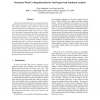Free Online Productivity Tools
i2Speak
i2Symbol
i2OCR
iTex2Img
iWeb2Print
iWeb2Shot
i2Type
iPdf2Split
iPdf2Merge
i2Bopomofo
i2Arabic
i2Style
i2Image
i2PDF
iLatex2Rtf
Sci2ools
124
click to vote
ICDM
2008
IEEE
2008
IEEE
Document-Word Co-regularization for Semi-supervised Sentiment Analysis
The goal of sentiment prediction is to automatically identify whether a given piece of text expresses positive or negative opinion towards a topic of interest. One can pose sentiment prediction as a standard text categorization problem, but gathering labeled data turns out to be a bottleneck. Fortunately, background knowledge is often available in the form of prior information about the sentiment polarity of words in a lexicon. Moreover, in many applications abundant unlabeled data is also available. In this paper, we propose a novel semi-supervised sentiment prediction algorithm that utilizes lexical prior knowledge in conjunction with unlabeled examples. Our method is based on joint sentiment analysis of documents and words based on a bipartite graph representation of the data. We present an empirical study on a diverse collection of sentiment prediction problems which confirms that our semi-supervised lexical models significantly outperform purely supervised and competing semi-su...
Data Mining | ICDM 2008 | Semi-supervised Sentiment Prediction | Sentiment Prediction | Sentiment Prediction Problems |
| Added | 30 May 2010 |
| Updated | 30 May 2010 |
| Type | Conference |
| Year | 2008 |
| Where | ICDM |
| Authors | Vikas Sindhwani, Prem Melville |
Comments (0)

